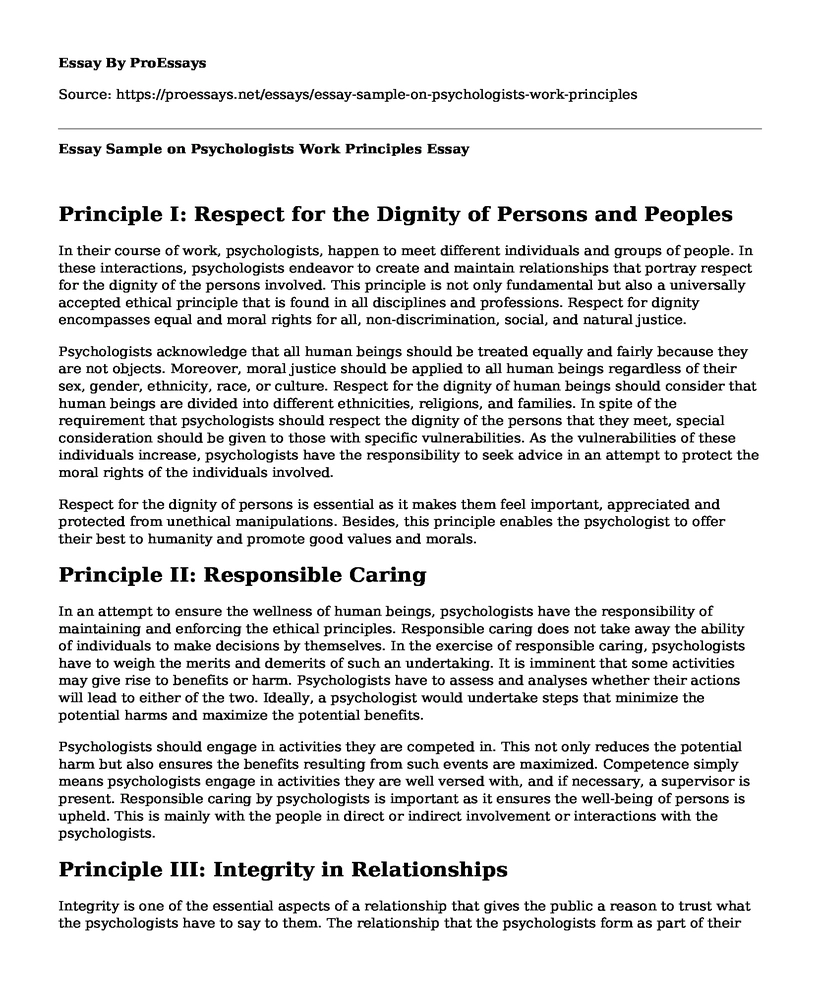Principle I: Respect for the Dignity of Persons and Peoples
In their course of work, psychologists, happen to meet different individuals and groups of people. In these interactions, psychologists endeavor to create and maintain relationships that portray respect for the dignity of the persons involved. This principle is not only fundamental but also a universally accepted ethical principle that is found in all disciplines and professions. Respect for dignity encompasses equal and moral rights for all, non-discrimination, social, and natural justice.
Psychologists acknowledge that all human beings should be treated equally and fairly because they are not objects. Moreover, moral justice should be applied to all human beings regardless of their sex, gender, ethnicity, race, or culture. Respect for the dignity of human beings should consider that human beings are divided into different ethnicities, religions, and families. In spite of the requirement that psychologists should respect the dignity of the persons that they meet, special consideration should be given to those with specific vulnerabilities. As the vulnerabilities of these individuals increase, psychologists have the responsibility to seek advice in an attempt to protect the moral rights of the individuals involved.
Respect for the dignity of persons is essential as it makes them feel important, appreciated and protected from unethical manipulations. Besides, this principle enables the psychologist to offer their best to humanity and promote good values and morals.
Principle II: Responsible Caring
In an attempt to ensure the wellness of human beings, psychologists have the responsibility of maintaining and enforcing the ethical principles. Responsible caring does not take away the ability of individuals to make decisions by themselves. In the exercise of responsible caring, psychologists have to weigh the merits and demerits of such an undertaking. It is imminent that some activities may give rise to benefits or harm. Psychologists have to assess and analyses whether their actions will lead to either of the two. Ideally, a psychologist would undertake steps that minimize the potential harms and maximize the potential benefits.
Psychologists should engage in activities they are competed in. This not only reduces the potential harm but also ensures the benefits resulting from such events are maximized. Competence simply means psychologists engage in activities they are well versed with, and if necessary, a supervisor is present. Responsible caring by psychologists is important as it ensures the well-being of persons is upheld. This is mainly with the people in direct or indirect involvement or interactions with the psychologists.
Principle III: Integrity in Relationships
Integrity is one of the essential aspects of a relationship that gives the public a reason to trust what the psychologists have to say to them. The relationship that the psychologists form as part of their communication and interaction is fundamental for the advancement of their scientific knowledge and help enhance the public confidence upon them and on what they say. The expectation from these psychologists that is associated with the integrity includes being faithful, honest, straightforwardness and accuracy and commitments to their words. It is important to note that one of the best ways to enhance integrity is by being faithful and morally upright. Besides, psychologists should be individuals with interests when conducting their activities and those who are critical thinkers based on what they say and how they act. Additionally, the value of straightforwardness and openness mainly exists mainly with the context of respect for the dignity for themselves and those of other people. Integrity and relationship mostly imply that psychologists should portray a higher level of honesty with the responsibility of maintaining competence in any areas that they find applicable.
Responsibility to Society
Psychologists in both their work and their role have a crucial responsibility to play to the society. It, therefore, shows that the psychologists should use their psychological knowledge serves the community. Besides, the same knowledge as skills can be used in the overall development of the human social structures and the various policies that seek to enhance the human developmental process. Besides, the psychologist should use their skills and knowledge to draw the attention of the public and member of the society to thinking positively on social life issues that seek to enhance a positive. In carrying out their activities, it is important the psychologists realize that most of the social structures have shown a slow growth. They should try as much as possible to enhance reality on other key issues that might not be easy for the human to understand based on their application on social life. Being responsible to the society by the psychologists has much importance that benefits society as a whole. One of the ways that the psychologists can be willing to contribute positively to the society is by collaborating and forming a partnership with other members of the society while at the same time accepts correction and criticism wherever possible.
Cite this page
Essay Sample on Psychologists Work Principles. (2022, Nov 01). Retrieved from https://proessays.net/essays/essay-sample-on-psychologists-work-principles
If you are the original author of this essay and no longer wish to have it published on the ProEssays website, please click below to request its removal:
- Research Proposal on the Necessity of Parental Involvement in the Education Life of a Child
- The Impact of the Mental Capacity Act of 2005
- Aging Effects and Personality Essay
- A Journey Towards Language Competence Acquisition Essay
- Description of Positive Emotion Essay
- Essay Example on Infants of Depressed Moms: Effects of Maternal Depression and Antidepressants
- Mental Health Challenges in the COVID-19 Pandemic: 45% of US Adults Affected - Essay Sample







